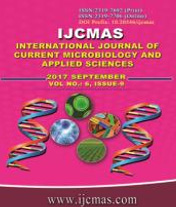


 National Academy of Agricultural Sciences (NAAS)
National Academy of Agricultural Sciences (NAAS)

|
PRINT ISSN : 2319-7692
Online ISSN : 2319-7706 Issues : 12 per year Publisher : Excellent Publishers Email : editorijcmas@gmail.com / submit@ijcmas.com Editor-in-chief: Dr.M.Prakash Index Copernicus ICV 2018: 95.39 NAAS RATING 2020: 5.38 |
Field experiments on the efficacy of novel insecticide molecules and neem products to grape thrips, Scirtohrips dorsalis Hood were conducted in Bijapur and Bagalkot district for two seasons during 2013-14. Among twelve treatments, fipronil 5% SC @ 1.0 ml/l, imidacloprid 17.8% SL @ 0.3 ml/l were significantly superior to other treatments with more than 87 per cent reduction of thrips damage over untreated control. The next best treatments were emamectin benzoate 5% SG @ 0.2 g/l, spinosad 45% SC @ 0.25 ml/l, thiomethoxam 25% WG @ 0.25 g/l recorded more than 73 per cent reduction of thrips damage over untreated control. Clothianidin 50% WDG @ 0.2 g/l, dimethoate 30% EC @ 1.0 ml/l, lambda cyhalothrin 5% EC @ 0.5 ml/l and acephate 75% SP @ 0.5 g/l recorded more than 48 per cent reduction of thrips damage over untreated control. Botanicals such as azadirachtin 1500 ppm @ 3.0 ml/l and Neem Seed Kernel Extract @ 5 per cent @ 5.0 ml/l were less effective than insecticides. The results of the two season trials revealed that all the insecticides were harmful to the population of thrips than botanicals. In addition to reduction in thrips population, imidacloprid 17.8% SL @ 0.3 ml/l recorded highest marketable fruit yield (41.63 t/ha) and maximum net return of Rs. 5,06,982 per hectare.
 |
 |
 |
 |
 |